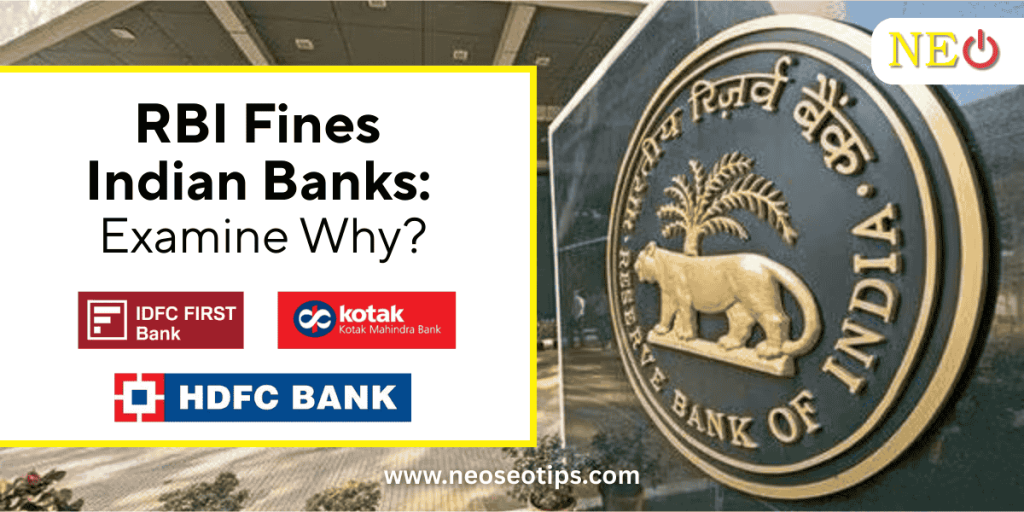On April 17, 2025, the Reserve Bank of India (RBI) fined ₹1.29 crore on three prominent banks: Kotak Mahindra Bank, IDFC First Bank, and Punjab National Bank (PNB), shocking the banking sector. The RBI's unwavering commitment to upholding operational integrity, customer protection, and transparency in Indian banking is demonstrated by these fines, which were the consequence of regulatory non-compliance. But what exactly went wrong, and what impact does this have on banks and their customers? Let's look at the specifics.
Table of contents [Show]
Looking at the RBI Penalties-
The RBI's fines were the consequence of through legal inspections that found noncompliance, not random actions. The fines were dispersed as follows:
- Kotak Mahindra Bank: ₹61.40 lakh for loan procedures, KYC standards, and customer service shortcomings.
- IDFC First Bank: ₹38.60 lakh for comparable problems, such as insufficient transparency and customer protection.
- Punjab National Bank: ₹29.60 lakh for failing to comply with loan-related procedures and KYC.
These RBI fines highlight specific areas where the banks fell short, from mishandling loan disbursements to failing to properly verify the identities of their clients. Since such oversights have the potential to erode trust and endanger consumers, the RBI is dedicated to preventing them.
Why Did These Banks Face Penalties?
An unavoidable pattern of regulatory non-compliance was found during the RBI's inspections. Among the major infractions were:
- KYC Failures: Insufficient customer identity verification, which is essential to stopping money laundering and fraud.
- Customer service lapses: include inadequate resolution of client complaints and opaque service provision.
- Problems with loan practices: include improper loan disbursement procedures, which may result in unfair practices or poor money management.
These defects go beyond minor technical errors and impact real people. For instance, inadequate KYC protocols may allow fraudulent accounts to pass through, and poor customer service may engender resentment and suspicion in clients. The RBI's fines are forcing banks to tighten their operations.
The Impact on PNB, IDFC First, and Kotak Mahindra-
Even though ₹1.29 crore might not seem like much in relation to the banks' total earnings, the penalties are very serious. In addition to the financial impact, the banks deal with:
- Reputational Damage: Publicly announced fines have the potential to erode consumer trust and draw attention from the media.
- Enhanced Oversight: The RBI may put these banks under more scrutiny and put more pressure on them to comply.
- Operational Changes: In order to avoid fines in the future, banks will probably make investments in improved systems, employee training, and compliance frameworks.
Crucially, the RBI made it clear that no customer agreements or transactions are void as a result of these fines. Although your investments, loans, or savings with these banks are still safe, the fines highlight the need for better procedures.
RBI's Function in safeguarding Indian Banking-
The Reserve Bank of India is the foundation of India's financial stability and does more than just act as a regulator. The RBI makes sure that banks behave morally, safeguard consumers, and uphold systemic trust by enforcing banking regulations. The Indian banking industry, which has recently struggled with issues like fraud, non-performing assets, and governance, is being strengthened in part by these fines. The proactive approach taken by the RBI makes it very evident that compliance is a must.
Implications for the Banking Sector-
The penalties imposed on PNB, IDFC First, and Kotak Mahindra are a microcosm of a broader pattern. All banks are being forced to prioritize as the RBI tightens its hold on banking compliance:
- Strong KYC procedures: To prevent fraud and guarantee responsibility.
- Customer-Centric Services: To increase satisfaction and trust.
- Transparent Loan Practices: To safeguard borrowers and avoid poor administration.
Since similar mistakes could result in fines, other banks are probably paying attention. Customers may gain from improved services and more robust protections as a result of industry-wide advancements.
Advice for Customers-
These fines serve as a reminder to you as a banking customer to be aware of your rights. What you can do is as follows:
- Recognize KYC Requirements: To prevent problems, make sure your bank has current identification and proof of address.
- Demand Transparency: Request unambiguous terms for services, fees, and loans.
- File a grievance: Resolve unresolved complaints through the RBI or bank channels.
Being proactive can help create a more dependable banking ecosystem and hold banks accountable.
Conclusion: An Advancement in Secure Banking
The RBI has issued a call to action in addition to fines against Kotak Mahindra Bank, IDFC First Bank, and Punjab National Bank. A more open and reliable Indian banking industry is being ushered in by the RBI's efforts to address KYC infractions, customer service deficiencies, and loan practice concerns. Customers can use this as an opportunity to interact with banks that value care and compliance. stay informed!








